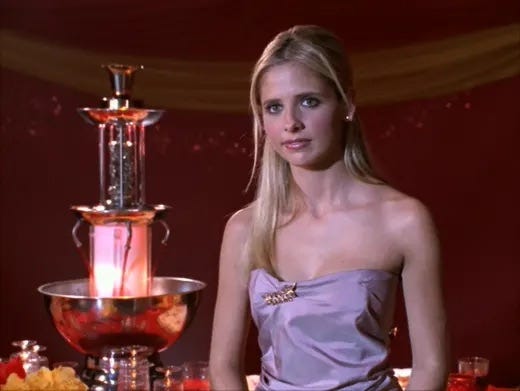In my old-fashioned definition, a television show requires a lot of product made in a short time on a restricted budget. It’s not a movie or play. The team is on deadline, doing it as well as they can, by any means necessary.
The current era of binge-watching peak streaming offers something different. The Old Man on FX looks like a well-made expensive action movie. Severance on Apple+ looks like a well-made expensive science fiction movie. In both cases, big stars helm top-notch ensembles.
Nothing against all that, really, but ain’t what I’d call TV. TV deals with limitations, compromises, and excuses.
Creator Joss Whedon says about Season One of Buffy the Vampire Slayer:
We shot the show in a big warehouse in Santa Monica. We don’t have a real studio to shoot in. …we were very much on a tight budget. [For the first twelve episodes set in Sunnydale High School], we only had the one hall. So, we use it over and over again.
Being creative in a tight space is my favorite. With certain exceptions, I don’t go so much for grand opera or the great American novel or meditative arty European cinema. I like jazz in the club, crime fiction, and Buffy.
A long-term soap opera can be partially defined as, “a story where everyone eventually sleeps with everyone else.” Soap opera or not, the plot possibilities of any TV show get used up over time. Eventually the reversals get more and more elaborate and ludicrous. The smart money quits before “jumping the shark,” but it turns out that little of the money is smart.
(I’m looking at you, The Old Man and Severance, both which had a chance at a fun and contained single season, but are suited up for what will presumably be even “bigger” second seasons.)
There were seven seasons and 145 episodes of Buffy the Vampire Slayer broadcast between 1997 and 2003.
Sarah and I have seen all of Buffy at least once. The show went on too long, a lot of sharks were in the water, so we’ve never felt compelled to re-watch season 7.
Some of the very best Buffy episodes are in seasons 4, 5, and 6. We’ve watched most of those a few times. Indeed, I’d argue that the fantastic musical episode “Once More With Feeling” early on in season 6 is the appropriate conclusion for the run.
But the heart of the matter is the first three seasons. We’ve watched these 56 episodes many times. The slayer and her team are still in high school, and the obvious yet juicy subtext is simply the trials of adolescence. Anyone can relate to the innocent themes.
Seasons 1 and 2 are great, but the show builds into something strangely profound in season 3. Season 3 is an apex.
It’s still TV, though. The team had to blast out 22 episodes, so how could they all be equally strong? On this last run we skipped “Revelations” and “Helpless.”
Four of the best land partially thanks to the longer context of previous seasons: “The Zeppo” (written by Dan Vebber), “The Wish” (Marti Noxon), “Doppelgangland,” (Josh Whedon), and “The Prom” (Marti Noxon).
Most finales are a bit disappointing. Season 3’s conclusion, “Graduation Day,” is pretty darn perfect.
Oz: "Guys, take a moment to deal with this. We survived.”
Buffy: "It was a hell of a battle."
Oz: "Not the battle. High School.”
Roll call:
Sarah Michelle Gellar as Buffy Summers
Nicholas Brendon as Xander Harris
Alyson Hannigan as Willow Rosenberg
Charisma Carpenter as Cordelia Chase
David Boreanaz as Angel
Seth Green as Daniel "Oz" Osbourne
Anthony Stewart Head as Rupert Giles
Kristine Sutherland as Joyce Summers
Eliza Dushku as Faith
Harry Groener as Mayor Richard Wilkins III
Alexis Denisof as Wesley Wyndam-Pryce
Creator, executive producer, and showrunner: Joss Whedon (also wrote five episodes)
Executive producer: David Greenwalt (wrote two episodes)
Co-producer: Marti Noxon (five episodes)
Executive story editor: Jane Espenson (three episodes)
Story editor: Douglas Petrie (two episodes)
Staff writer: Dan Vebber (two episodes)
Additional writing: Dan Fury and Thania St. John
Directors: Joss Whedon, James Whitmore, Jr., James A. Contner, David Greenwalt, Michael Lange, David Semel, Michael Gershman, David Grossman, Regis Kimble, David Solomon
Giles: "There's a certain dramatic irony attached to all this. A synchronicity that borders on predestination, one might say."




